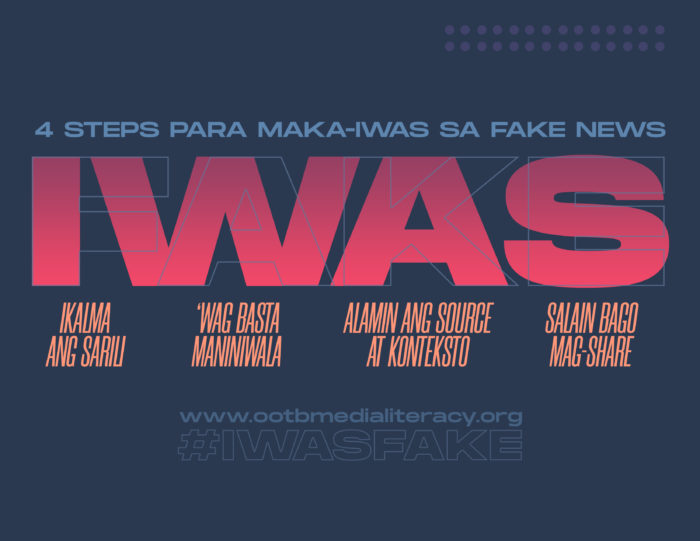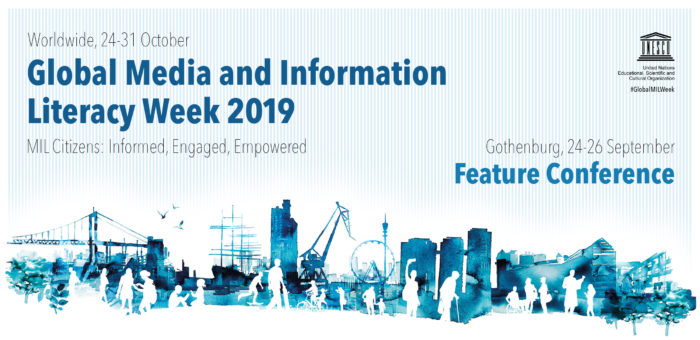From magazines to TV ads to music videos, girls today are bombarded by media images. The media that girls are consuming contain strong and powerful messages saying that girls’ worth is tied to their appearance.
This video is made in cooperation with the UP Broadcasters’ Guild.
How do you present yourself to the world online and offline? What does it mean to be “real” or “fake”?
Online, people might feel free to invent new personas, or change particular parts of themselves. While it carries benefits, assuming different personas online also brings risks. Cyberbullying is one.
This video is made in cooperation with the UP Broadcasters’ Guild.

“Hindi lang sa COVID-19, sa Fake News ay umiwas din.”
Ngayon sa panahon ng krisis, kailangan natin maging alerto hindi lang sa pagkalat ng virus kundi pati sa fake news. Naglipana sa social media ang iba’t-ibang impormasyong tungkol sa COVID-19, mga balitang ‘di natin alam saan nanggaling, mga video, larawan, post, meme, atbp. na nag-aalok ng sagot sa ating mga gustong malaman.
Bilang tayo ay naka-quarantine, pare-parehas tayong babad sa social media. Oras-oras maghapon ang ating ginugugol sa pagscroll, pagclick, at pagview ng kung anu-anong media. Hindi malabong may masalit na FAKE NEWS sa ating mga feed, mga impormasyong kaduda-duda ang laman.
Ano nga ba ang dapat gawin upang hindi mabiktima ng pekeng balita?
4 Steps Para Maka-IWAS sa Fake News:
[I] kalma ang sarili
[W] ag basta maniniwala
[A] lamin ang source at konteksto ng mensahe
[S] alain bago mag-share at sitahin ang nagkakalat ng mali
Ikalma ang sarili: Karaniwan ang fake news ay naglalaman ng nakakaakit o nakakagalit na impormasyon. Kung ikaw ‘yung tipong madaling madala ng emosyon, malamang madali ring makuha ng pekeng balita ang atensyon mo. Ang unang hakbang ay paghinto. Napakabilis ng daloy ng impormasyon online, ‘di ka dapat padalos-dalos. Kalma muna para makapag-isip nang tuwid.
‘Wag basta maniniwala: Kahit gaano pa kapani-paniwala ang isang post sa iyong paningin, laging mong isipin na baka mali ka at fake news pala ito. Sa panahon ngayon na laganap ang panloloko, dapat ay palagian kang nagdududa. Kahit ang mga bagay na “matagal mo nang alam” o “nakakatiyak ka”, maaaring mali pala. Sabi nga sa kanta, ‘wag mabubulag sa maling akala. Mabuti na ang sigurado kesa sa siguro lang.
Alamin ang source at konteksto ng mensahe: Alamin ang pinanggalingan ng impormasyon. Kilalanin kung sino-sino ang mga mapagkakatiwalaan at ang hindi. Kung hindi mo natitiyak ang isang bagay, hanapin ito at ipagtanong sa ibang source. Kapag mas malawak at mas malalim na ang alam mo sa isang isyu, ‘di ka na basta malilinlang sa kapos o sa minanipulang impormasyon.
Salain bago mag-share at sitahin ang nagkakalat ng mali: Tandaan – Hindi lahat ng bagay ay dapat i-share. Padaanin muna sa masusing pagsiyasat ang isang impormasyon bago ito ibahagi sa iba. Kung ang gusto mo naman ay makapagpatawa o pumukaw ng emosyon gamit ang impormasyong alam mo namang kaduda-duda, isipin mo muna sino ang makakakita at ang magiging epekto nito. Maging mas sensitibo sa iyong mga ishine-share at ‘wag magsawang sumita ng ibang nagkakalat ng maling impormasyon.
Gaya ng madalas na paghuhugas ng kamay, ugaliin ang pag-IWAS sa Fake News. Hindi basta-basta mawawala ang Fake News sa ating paligid ngunit meron tayong mga pwedeng gawin upang labanan ang pagkalat nito.
[I]kalma ang sarili. [W]ag basta maniniwala. [A]lamin ang source at konteksto ng mensahe. At, [S]alain bago mag-share at sitahin ang nagkakalat ng mali. #IwasFake
Fake news. Alternative facts. Whatever you call them, they’re all untrue and unreal. Here’s how to spot them, mga bes. Say #NoToFakeNews. Be an #AntiFakeNews advocate.
Watch Part 2 below.
This campaign is made in cooperation with SubSelfie.com.
Kung noong una, we shared with you how to spot fake news, ngayon naman, it’s time to take a more proactive stance. Ano nga ba ang magagawa mo para pigilan ang pagkalat nito? Alamin sa ikalawang bahagi ng aming #AntiFakeNews.
Watch Part 1 above.
This campaign is made in cooperation with SubSelfie.com.
Amid political advertisements, media statements, and biased judgements, seek the truth. The future of the country depends on you.
Suri at Pili is a special forum dedicated for the Philippine elections. We discuss the role of media literacy in shaping democracy as well as the responsibility of the youth in civil society participation.
This video is made in cooperation with DAKILA.
The election is not as easy as “swipe right” or “swipe left”. Take time to choose the leaders of the country because your future–your families and the generations to come–depends on you.
Suri at Pili is a special forum dedicated for the Philippine elections. We discuss the role of media literacy in shaping democracy as well as the responsibility of the youth in civil society participation.
This video is made in cooperation with DAKILA.
Don’t go to the election unprepared. The future of the country depends on you.
Suri at Pili is a special forum dedicated for the Philippine elections. We discuss the role of media literacy in shaping democracy as well as the responsibility of the youth in civil society participation.
This video is made in cooperation with DAKILA.

During Look Out Bootcamp 2019, our articipants gathered and grouped together to discuss possible projects for the Global Media and Information Literacy Week on October 24-31, 2019.
We gave them a simple outline that they used to start planning for their dream activities. View their plans below and check what may be applicable to your school. You can adapt or modify those to suit your school or community’s settings.
These proposed activities only are tentative. If your school or community decides to launch a project, let us know so we can feature you.
Sa pagtatapos ng Global Media and Information Literacy Week 2017, ibinabahagi ng Out of The Box sa inyo ang isang PANATA ng ilang senior high school students mula sa iba’t-ibang lungsod sa Luzon. Gaya nila, hangad namin na harapin din ninyo ang hamon na ugaliing maging mapagmatiyag, matalino, at mapanuri sa paggamit ng social media.
Tags #Bias #Biased and #BiasMedia have been trending for quite sometime now. Media bias has been one of the hottest issues in the country, at least since the 2016 national elections. As part of the 2016 Global Media Literacy Week, we talked to some local journalists from different media organizations to ask them about their insights on this issue. So, how is the media really #biased?
In response to the shift in distance learning caused by the COVID-19 pandemic, we conducted a webinar series that aims to empower MIL teachers to confidently and effectively handle their subject amidst the challenges in the new normal in education.
The #MIL4Democracy webinar series aims to situate MIL against the backdrop of growing social concerns such as the alarming spread of disinformation; attacks on press freedom and free speech; and the rising cases of cyber threats and online-based violence in the country and the whole world. Media & Information Literacy must not be taught devoid of social realities and must always be pursued with the larger vision of promoting democracy and civic participation.
Schedule an Appointment
[mc_contact_top form=MakeAnAppointment]